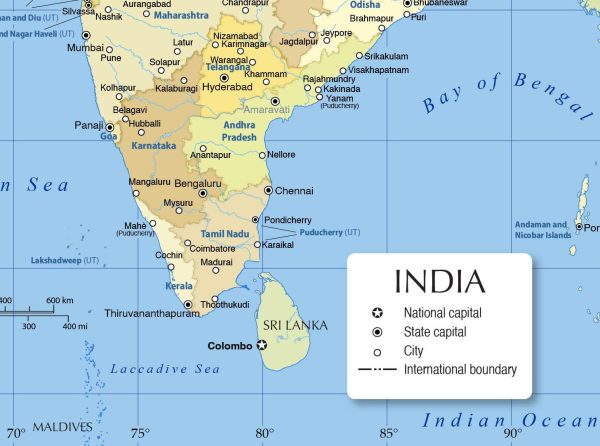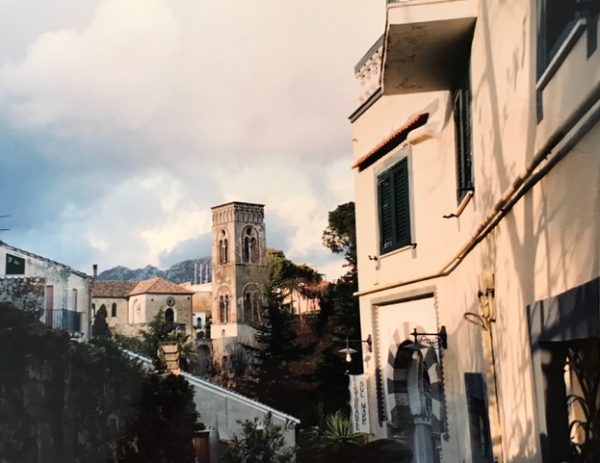#57: Sri Lanka, India and Italy, January – March 2005
Farewell, Homecoming and Travels to Italy’s South
As I read over letters sent to family and friends about our first months of 2005, our lives then seem bustling. Yet I don’t recall them that way. Twenty years bring distance and dimming memories. Yet, here they are, the days of our lives in those faraway places. Leaving Sri Lanka, returning to Amelia — both transitions full of emotion — with a sojourn in Kerala offering respite for the soul. Then a couple trips south in Italy (one to Reggia Caserta, the other to Ravello) offered unexpected adventures.
Here are edited excerpts from those letters.
January
Where to begin to describe the events of recent weeks? You’ve already read our account of surviving the tsunami. No need to repeat the tale of that challenge.
So let me go back before the tsunami to Colombo, where we were feted within an inch of our lives as so many wanted to bid Russell a fond farewell. For me, the highlight was the party hosted by the country director of the World Bank, where we were decked in traditional garlands and treated to a very fancy catered dinner attended by the Resident Rep of UNDP, the Chief Deputy of the former Prime Minister, and a ranking business leader. It was apparent how fond they all were of Russell and how much they were going to miss him.
Our return to Colombo after the disaster found us trying to do our part to help. We used the occasion of Russell’s “packing out” to box up rugs, housewares, clothes and shoes; add rice, lentils, milk powder and other relief supplies. Then we sent them south with one of Russell’s Sri Lankan colleagues, knowing they’d surely reach folks in need as soon as possible.
Life had to go on. The goodbye lunches and dinners continued after we returned to Colombo, although obviously much subdued. Again and again, party guests and hosts expressed the hope that the disaster would bring the diverse political factions together, with everyone realizing they were Sri Lankans first and whatever, second.
I managed to do a little shopping for friends back in Italy, as well as a few things for us, and to oversee the packing of the remainder of Russell’s personal and household effects for shipping home. I was impressed with the team sent by the local shipper — very professional, efficient, and most of all, careful.
Then we flew to Kerala for our long-planned transition-vacation. Many people have asked if we didn’t want to go directly home after the tsunami, but we felt it was more important than ever to reaffirm that we can all persevere, whatever our experiences of the disaster.
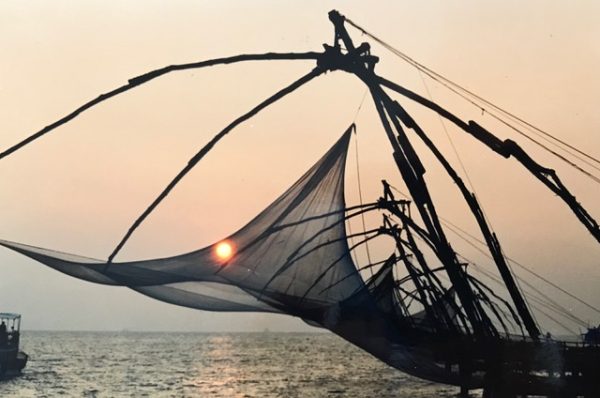 The west coast of India was hardly affected by the tsunami, and it was fascinating to visit Cochin, a city so important in world history. It’s been down on its luck for some time, but it was heartening to see it now on its way back up. Many old buildings, including our hotel, have been renovated for new uses — shops, museums, hotels, etc. — but the original charm remains. We visited the church where Vasco da Gama was buried until his son arrived to take him home to Portugal. We saw the descendants of the giant fishing nets, nearly two stories high, brought to this part of the world by Kublai Khan’s mammoth fleet of exploration. We attended an evening of traditional dance, bringing to life what I had only seen in books and photos.
The west coast of India was hardly affected by the tsunami, and it was fascinating to visit Cochin, a city so important in world history. It’s been down on its luck for some time, but it was heartening to see it now on its way back up. Many old buildings, including our hotel, have been renovated for new uses — shops, museums, hotels, etc. — but the original charm remains. We visited the church where Vasco da Gama was buried until his son arrived to take him home to Portugal. We saw the descendants of the giant fishing nets, nearly two stories high, brought to this part of the world by Kublai Khan’s mammoth fleet of exploration. We attended an evening of traditional dance, bringing to life what I had only seen in books and photos.
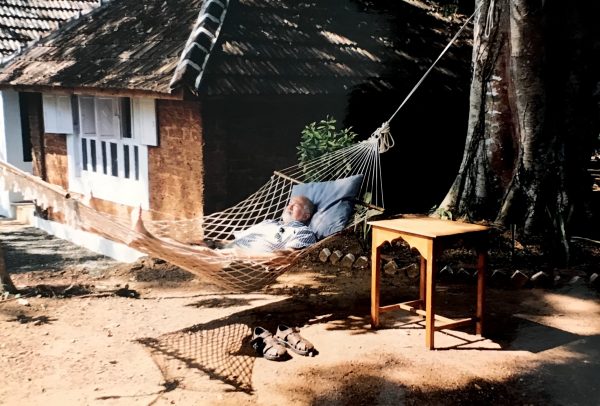 We also took a couple days and went upcountry to our hotel’s sister property, a renovated rubber-plantation manager’s bungalow, complete with hammocks in deep shade, ceiling fan above the bed and carved shutters to make it tough for mosquitoes to pass through glass-less windows.
We also took a couple days and went upcountry to our hotel’s sister property, a renovated rubber-plantation manager’s bungalow, complete with hammocks in deep shade, ceiling fan above the bed and carved shutters to make it tough for mosquitoes to pass through glass-less windows.
One thing we didn’t do was take a backwater cruise on the local version of a houseboat, a fantasy of wicker roofs atop a wooden barge. During one of Russell’s mentoring trips back to Sri Lanka, we’re planning to rent one, hopefully with dear Sri Lankan friends and gaze at the passing scene, including the justly famous bird life.
Those eventful weeks over, it’s lovely to return to the peaceful life of Umbria. Yet in a very strange way, I feel myself lucky to have experienced one of nature’s marvels, despite the heartbreak and suffering I’ve witnessed with my own eyes. The terrible scenes of destruction will stay with us forever, but so will the balm of help and caring that immediately poured from ordinary people reaching out to neighbors and compatriots.
Here in Amelia, we’ve been deeply touched by how glad people are to see us: folks we had thought of as acquaintances dodging traffic to run across the street and embrace us; a professor of English, an Italian married to a Scot and more dour than he, bursting into tears when she saw us in the coffee bar; Ornella unable to stop crying when we stopped by to give the presents we’d brought from Sri Lanka. These are just a few of the moving experiences we’ve had since returning home, another reminder of how lucky we are to live here.
February
Toward the end of January, we went with friends Elisabetta, Valentina and Lorenzo to Reggia Caserta, the palace built by the Bourbon King Charles III when he ruled over southern Italy. Meant to rival Versailles, it has over 1000 rooms. The lavish, baroque decor and grand staircases were seriously over-the-top. The room I found most interesting contained a huge creche, perhaps ten feet 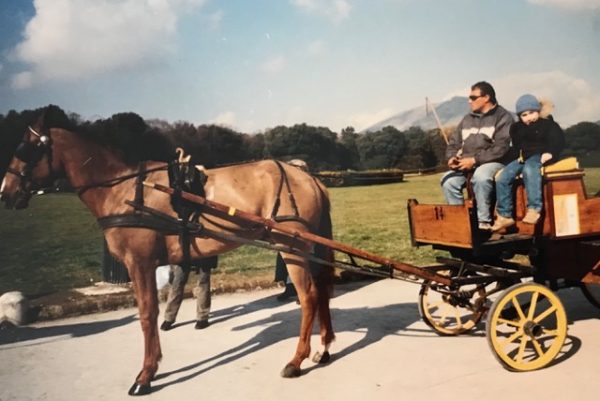 high and fifteen feet in diameter, depicting all of Bethlehem on Christmas night. Bakers and merchants, lumbering camels and creeping cats, screaming fishwives and snoozing drunks — everyone and everything perfectly depicted.
high and fifteen feet in diameter, depicting all of Bethlehem on Christmas night. Bakers and merchants, lumbering camels and creeping cats, screaming fishwives and snoozing drunks — everyone and everything perfectly depicted.
Perhaps the highlight of the trip was taking a carriage ride around the kilometer-long axis of pools and fountains that anchor the palace’s formal gardens. Five year-old Lorenzo got to sit with the driver, and I will never forget the look of wonder and pleasure on his face. The horse threw a shoe along the way, and the driver offered it as a souvenir, to Lorenzo’s delight.
We’d planned to stay through Sunday morning, but the weather forecast imminent snow. We decided to leave early and visit Italy’s version of an outlet mall, just south of Rome. Our Italian friends found good shopping, and we were content to just view what was on offer and compare the mall to its American counterpart (better exterior design, more or less the same goods).
We got home just before the snow hit, and since then, we’ve had wave after wave of arctic weather, often with snow, sometimes with rain, but always with below-normal temperatures. We wear long johns outdoors, keep a fire burning in the kitchen and head to bed early to read between flannel sheets. Hopefully, with March just around the corner, this won’t last much longer.
The other news of note is our Battle of the Bureaucracies. The water board said we owed 460 euros, but at the same time they’d over-debited our bank account for 209 euros. Even so, they said, if we didn’t pay the 460 immediately and directly, they’d turn our water off! Telecom somehow managed to shut off our dedicated fax/email line and say there was no record of our ever having had one. And the Fire Department said they had no official documentation for moving our gas tank underground even though that had been supplied long ago. We finally hired a “fixer,” an Englishman married to an Italian who does this sort of thing for a living. As I write, everything has been resolved, and we’re back to normal. It’s a great joy to live in Italy, but there are a few thorns among the roses…
On the writing front, I’ve sent eight more submissions to UK agents for my first book and re-started the second one. I keep remembering John Grisham, who sent out 57 submissions for his first book before giving up, printing and marketing it himself.
March
That bit about the lion and the lamb was really true of March this year. We went down to Ravello on the Amalfi Coast for the weekend of my birthday on the fifth. We set out Friday morning, dropping first by Terni, our provincial capital, so Russell could pick up his renewed Permisso di Soggiorno (like a resident alien visa). We left home in a mild rain, which had cleared up by the time we departed the Questura (provincial HQ).
But the farther south we went, the harder it poured. We had to slow down for the sake of safety, adding two hours to a 3.5 hour trip. Finally, just as it was growing dark, we found the turnoff from the coastal road to Ravello and wound up a narrow valley through rain and fog so thick we couldn’t see more than a few feet in front of the car. We kept following signs for “Ravello Centro,” knowing that we were looking for the main piazza, from which we were to phone the hotel for further directions.
We ended up in a large parking lot from which we could see nothing. We called the hotel and tried to explain where we were. The woman who answered kept asking if we’d passed through a tunnel. Nope, no tunnel. “Well,” she said, “you’ll have to leave your luggage in the car and walk to the hotel.” “OK,” we said, “How do we get there?” “How do I know?” she replied, “I have no idea where you are.” We gave up in frustration, struggled into our raincoats inside the car, fought the wind to open our umbrellas and made our way to a barely discernible stairway leading up into the fog, a diffuse glow of light above.
Lo and behold, we emerged in the main plaza, across which we could see the dim blush of a coffee bar. We went over to inquire the way to the hotel. “Turn right, signora,” said the barman. “Where?” “There,” he gestured vaguely. “The first street on the right?” I asked. He shrugged and nodded at the same time, so we lurched out into the howling rainstorm, holding one hand to the wall until we found the street.
Up and up we hiked, following dimly-perceived signs marked “Villa Maria” (the right name, at least) until we’d gone half a mile into the old town and arrived at a wrought-iron gate with a handsome sign beside it. Into the garden and toward the renovated villa, only to find two separate entrances. We decided on the one with the doorbell, rang and waited. And waited. Finally, someone came and said, “You’re at the wrong door.” But they let us in and agreed, after some hassling, that the owner’s son would accompany Russell back down to the parking lot, drive the car through the narrow streets to a nearby lot and carry our baggage up the hill.
I settled down to a cup of tea in the salon and read a couple magazines while I waited. And waited. Finally, Russell and son Francesco and another man appeared, sporting big grins on their faces and toting our soaked luggage. We were shown to a lovely room that seemed to be a free upgrade in token of our suffering. We started to unpack and clean up.
Just as we were standing in our underwear, ready for a hot shower, we realized we hadn’t made a reservation for dinner. And this hotel was famous for its restaurant. So Russell called the front desk, only to be told that the restaurant was closed that night because of unforeseen technical difficulties in the kitchen.
Why hadn’t they told us that when we’d arrived, we wondered. Too well-bred to say so, we asked what they would suggest. “Hard to say, signore, most restaurants are closed tonight, but we’ll call around.” We decided there was no point in getting showered and changed, so we put our travel-worn clothes back on. The front desk called, “Villa Amore is open tonight, but you must go NOW.”
Back out through the night, the fog and the torrential rain, down a narrow street, up a narrow stairway between high walls, along a narrower passageway, and there, gleaming in the mist was the “Villa Amore” sign. Inside the doorway and into a tiny entranceway with hallway beyond, along the hall, down two flights of stairs, and we arrived at the restaurant. I never thought I’d be so happy to have pasta with seafood and a glass of wine.
Saturday turned out gray, with misting rain now and then, yet far, far better than the weather we’d arrived in. We toured Ravello’s two famous gardens (one too formal for my taste, the other more rambling and natural), its cathedral and various other high spots, ate some nice, hot food in the local taverna and had an altogether fine time. That night, we enjoyed a special dinner at Villa Maria, where all the staff went out of their way to wish me “Buon Compleanno.”
On Sunday, we decided to revisit Positano, one of the most famous towns on the Amalfi Coast and last seen some 20 years ago. We got Francesco to drive the car down to the piazza (believe me, neither of us could get that car through turns with only an inch to spare on each side) and set off. Russell noted that the gas tank was low, but we decided we didn’t have to hunt out the station in Ravello, which was on a different road from the one we needed to take. We’d get gas in Amalfi. The main town on the coast, right? Easy to find gas there on a Sunday.
Wrong. We got to Amalfi with no trouble and asked a local policeman where the gas station was. “Oh, it’s closed today, signora.” “Where’s the nearest one?” “Where are you heading?” “Positano.” “No problem. Their station is always open, and it’s only 20 minutes away.”
We continued along the famous (infamous?) coastal road, around hairpin turns where the road narrowed to less than two lanes, across rushing cataracts on curving bridges, beside cliffs that pushed out into the road, until at last we saw a gas station just over there, around a few more turns and across the bay. By now, the gas gauge was riding on reserve, and we were feeling more relieved than I can say to see that “Q8” sign.
But we weren’t yet in Positano, and the Q8 station was closed. On and on, up and down, around and around, watching the gauge sink and thinking through what we’d do if we ran out completely. Finally, the road ascended up, up until we arrived at the top of Positano, a beautiful town that cascades down to the sea. “Where’s the gas station?” we asked the policeman at the crossroads. “Turn left,” he said.
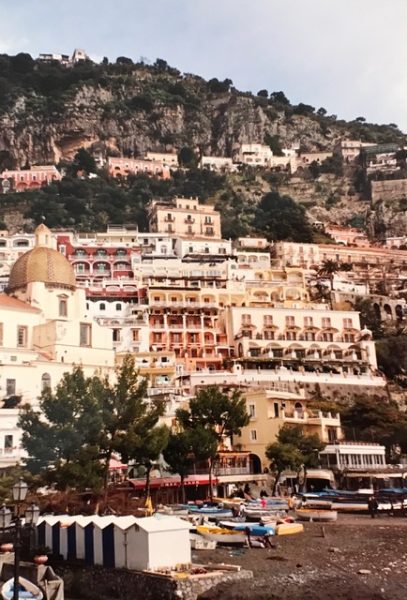 Turn left we did and wound down through narrow streets with steep cliffs on one side, wondering what we’d do if we met someone coming up. Finally, after what seemed like one of the great ordeals of our lives, we spotted the gas station in one of the sharp turns, pulled in and filled up the tank. Then we realized the station also had a parking lot and asked if we could leave the car there. “How much did they buy?” shouted the owner. “Thirty euros,” cried the attendant, and we were waved through. What would we have done had we not spent the equivalent of $40, I don’t know, because parking in Positano is next to impossible.
Turn left we did and wound down through narrow streets with steep cliffs on one side, wondering what we’d do if we met someone coming up. Finally, after what seemed like one of the great ordeals of our lives, we spotted the gas station in one of the sharp turns, pulled in and filled up the tank. Then we realized the station also had a parking lot and asked if we could leave the car there. “How much did they buy?” shouted the owner. “Thirty euros,” cried the attendant, and we were waved through. What would we have done had we not spent the equivalent of $40, I don’t know, because parking in Positano is next to impossible.
After that, it was all downhill, literally and figuratively, as we strolled past shops full of lovely clothes and housewares and all manner of things which can be made by hand. After some 20 minutes of this, we arrived at the shore, where we found two restaurants open and chose the one that promised to fix fried calamari, even though it wasn’t on the menu. Gosh, that was a special treat, sitting by the sea, gray clouds and weak sunshine repeatedly taking turns, while eating one of my favorite dishes.
Monday morning, it was time to go back home, but imagine our consternation when we opened the shutters for a view of the sea, only to be greeted by a snow storm so fierce we couldn’t see across the valley, let alone down to the water! It kept snowing through breakfast. We returned to the room to finish packing in case it would let up. Finally, it slowed a bit, and I called an Amelia friend to find out what was happening there. “Sun,” she said, so we decided to leave if the snow stopped and the streets cleared.
This happened in about an hour, so we headed down the hill, along the coastal road and up the highway toward Naples, the weather improving all the while, although there was snow on all the hillsides, often coming right down to the road. We could see snow-capped Vesuvius from far away, an amazing sight hanging in the gray-blue sky. The rest of the trip was relatively uneventful, and we arrived safely home, trying to remember when we’d last had such an adventure outside the Third World. Surely this was one of my most memorable birthdays.

COMING NEXT MONTH
#58: Italy, Here and There
A sudden death, Zack sends Russell
to the hospital and vipers dance.

LET ME HEAR FROM YOU.
Please take a moment to share your thoughts.
Your comments help make the blog better, and I always answer.
* * *
If you enjoyed reading this post, I hope you’ll SUBSCRIBE by clicking on the button below. Every month, when I post a new excerpt from my life overseas, you’ll get an email with a link so you can read the next installment. Subscription is free, and I won’t share your contact information with anyone else. Your subscribing lets me know you’re reading what I write, and that means a lot.

